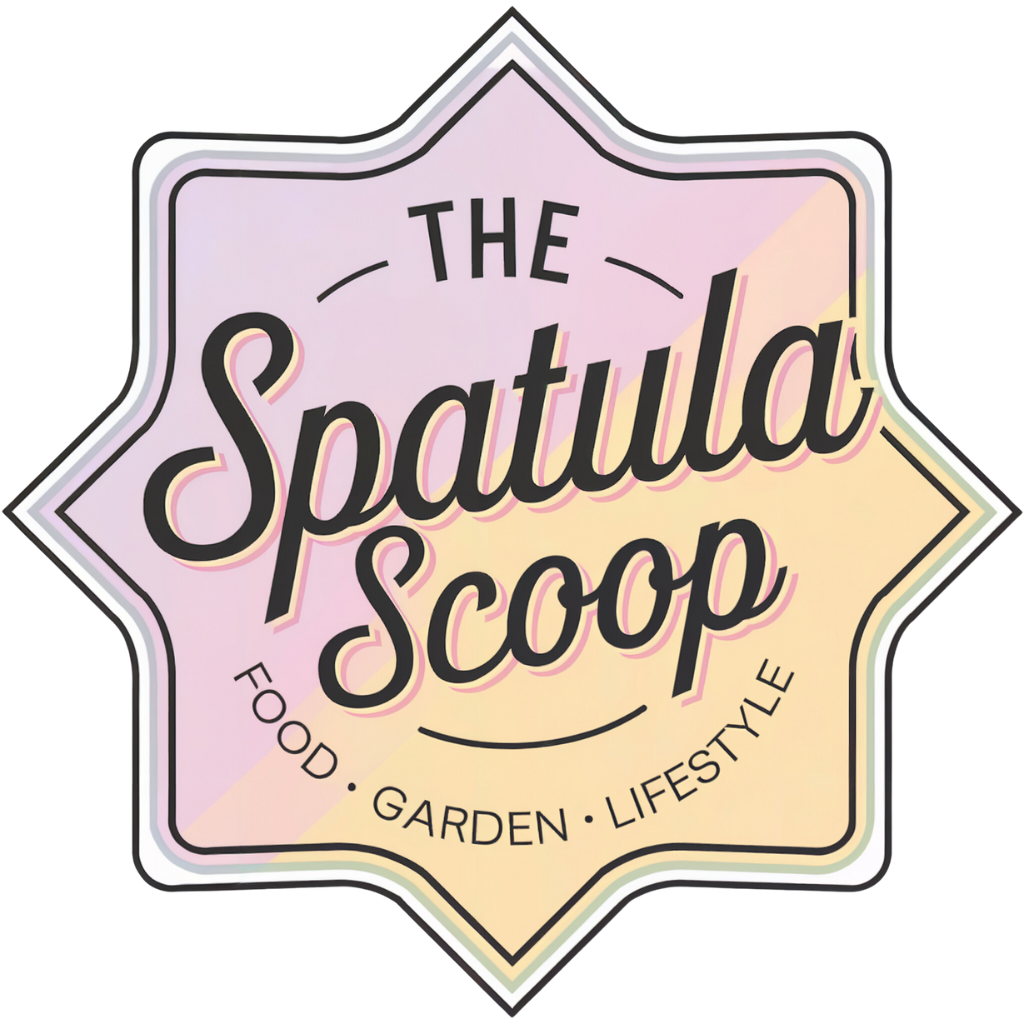Is It Safe to Eat Raw Brussel Sprouts
Raw Brussels sprouts are generally safe to eat, but there are some factors to keep in mind. They're packed with nutrients like vitamins C and K, fiber, and antioxidants. However, raw sprouts can be harder to digest and may cause gas or bloating in some people. They also contain compounds that can interfere with thyroid function if consumed in large amounts. To enhance safety and flavor, you can lightly blanch or shred them before eating. Proper washing and storage are essential to prevent foodborne illness. While raw Brussels sprouts offer nutritional benefits, balancing your intake with cooked varieties can provide the best of both worlds. Exploring preparation methods can reveal their full potential.
This post may contain affiliate links. If you make a purchase through these links, I may earn a commission at no additional cost to you. Additionally, portions of this post may be generated using artificial intelligence (AI) technology. While we strive for accuracy, please be aware that AI-generated content may not always be perfect and should be fact-checked when necessary.
The Spatula Scoops
- Raw Brussels sprouts are generally safe to eat for most people, but may cause digestive discomfort in some individuals.
- Thorough washing of raw Brussels sprouts is essential to remove potential dirt and pathogens.
- Raw consumption may interfere with iodine absorption in those with thyroid issues.
- Cooking Brussels sprouts for 5-7 minutes can improve digestibility and reduce potential risks.
- Raw Brussels sprouts retain more nutrients but can be harder to digest than cooked ones.
Nutritional Profile of Raw Brussels Sprouts
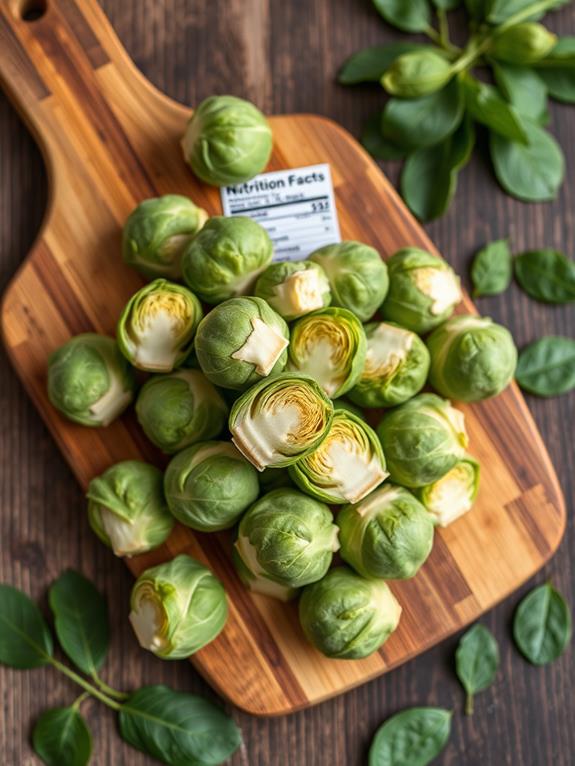
Raw Brussels sprouts are an excellent source of vitamins C and K, providing significant daily values in just one serving. This means you're supporting your immune system and bone health with every bite. They're also high in dietary fiber, which is vital for maintaining a healthy digestive system and promoting gut health. Additionally, incorporating nutrient-dense foods like Brussels sprouts into your diet can enhance your overall nutritional intake, similar to how palm oil is used in various products for its efficiency and nutritional properties in moderation the efficiency of palm oil.
One of the standout features of raw Brussels sprouts is their antioxidant content. These compounds, along with glucosinolates, offer potential anti-inflammatory and anticancer properties. By including raw Brussels sprouts in your diet, you're not only getting these protective benefits but also essential minerals like folate and manganese.
The health benefits of raw Brussels sprouts extend beyond their vitamin and mineral content. They're a nutrient-dense food that can contribute to your overall wellness, providing a range of vitamins, minerals, and beneficial plant compounds in a low-calorie package.
Health Benefits and Potential Risks
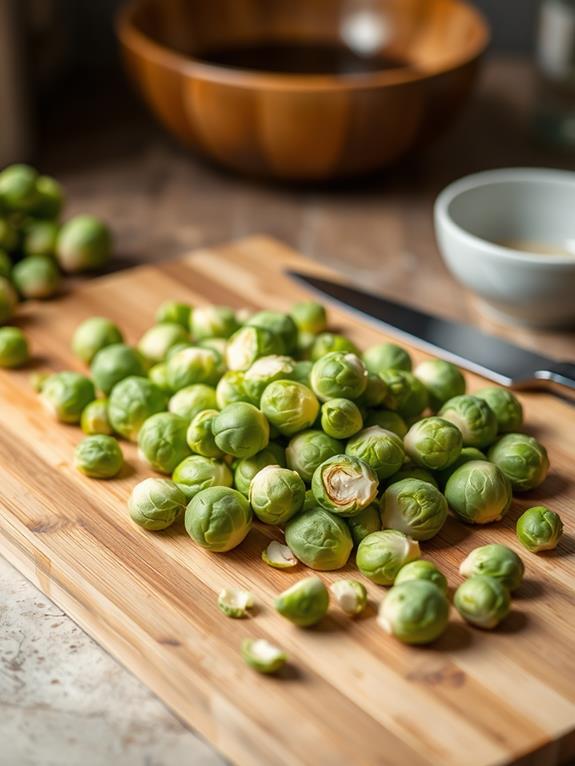
While raw Brussels sprouts offer numerous health benefits, they also come with potential risks that you should consider. These miniature cabbages contain glucosinolates, compounds that may have anticancer properties. The high fiber content, similar to the fiber found in many ingredients used in Miaowoof homemade popsicle recipes, can improve digestion but also lead to gas and bloating, especially if you have digestive disorders. However, if you're prone to thyroid issues, eating raw Brussels sprouts could interfere with iodine absorption, potentially leading to iodine deficiency.
The indigestible fiber in raw Brussels sprouts can cause gas and bloating, especially if you have digestive disorders. While they're generally safe for healthy individuals, overconsumption might result in gastrointestinal discomfort. Additionally, some people find the bitter flavor of raw sprouts unpalatable.
Cooking Brussels sprouts can release more nutrients by activating myrosinase, an enzyme that converts glucosinolates into beneficial isothiocyanates. This process may enhance the health benefits of Brussels sprouts. If you choose to eat raw Brussels sprouts, guarantee proper washing and preparation to minimize pathogen risks.
Raw vs. Cooked Brussels Sprouts
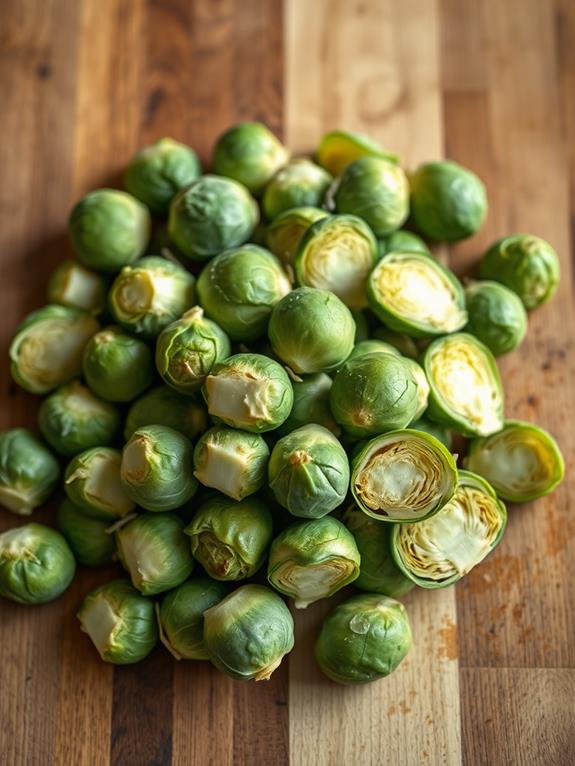
Raw Brussels sprouts are safe to eat for most people, but they may have a bitter flavor and cause digestive discomfort due to their high fiber content. Additionally, how to properly clean stains from produce can further enhance your overall experience when preparing meals. Cooking Brussels sprouts can enhance their taste and improve digestibility.
Here's what you need to know about raw vs. cooked Brussels sprouts:
- Raw sprouts retain more nutrients but may be harder to digest
- Cooking for 5-7 minutes enhances flavor and reduces bitterness
- Overcooking leads to mushiness and increased bitterness
- Cooking activates beneficial compounds like isothiocyanates
Cooking Brussels sprouts through steaming or sautéing can transform their taste and texture. This process also activates myrosinase, an enzyme that converts glucosinolates into health-promoting isothiocyanates. However, if you have thyroid conditions, you might want to limit your intake of raw Brussels sprouts. Their goitrogen content can interfere with iodine absorption, potentially affecting thyroid function. For most people, a balance of raw and cooked Brussels sprouts in your diet can provide ideal nutrition and enjoyment.
Preparing Raw Brussels Sprouts
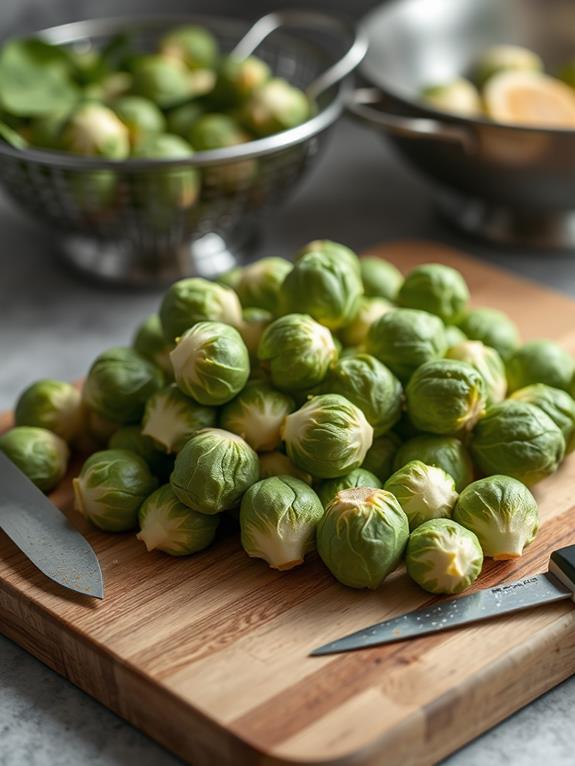
Now that we've explored the differences between raw and cooked Brussels sprouts, let's focus on how to prepare them raw. When preparing raw Brussels sprouts, your first step should be to wash them thoroughly. This is essential for removing dirt and potential pathogens, ensuring your safety when you consume raw vegetables. Additionally, using clean kitchen tools can enhance your food preparation experience; for example, a reliable juice squeezer, like the KitchenAid Citrus Juice Press, can make your citrus prep mess-free.
Next, trim the ends and remove any wilted or yellow outer leaves. This improves both flavor and freshness. To enhance texture, thinly slice or shred the sprouts. This makes them more enjoyable in salads or as a crunchy addition to sandwiches.
If you're sensitive to the bitterness of raw cruciferous vegetables, consider blanching the sprouts briefly. This involves dipping them in hot water for a short time, then cooling them in ice water. It can help reduce bitterness and make them more palatable.
Recipes Using Raw Brussels Sprouts
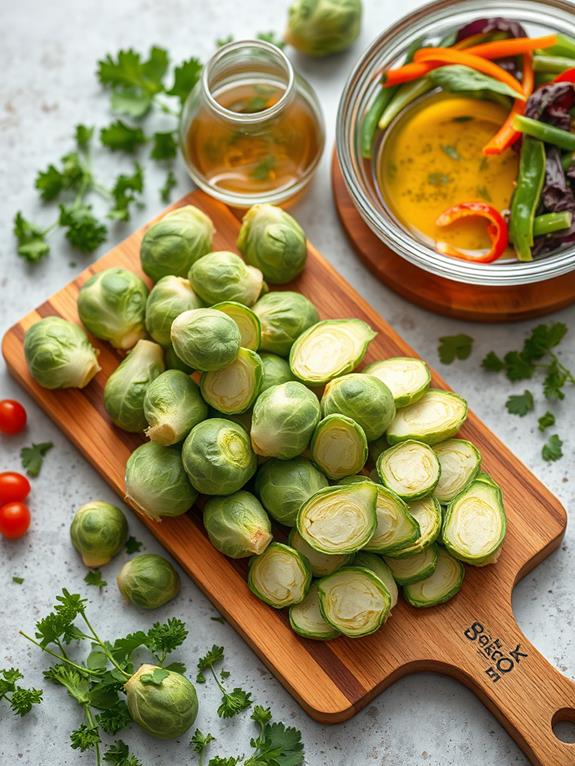
Immerse yourself in the world of raw Brussels sprouts with these delicious recipes that'll transform your perception of this often-overlooked vegetable. You'll discover that thinly sliced Brussels sprouts can be a versatile and delicious addition to your culinary repertoire, as they provide a unique texture that complements a variety of herbs like basil and parsley. Try creating a vibrant Brussels sprout slaw with apples and pecans, dressed in a honey vinaigrette to balance the natural bitterness. For a unique twist, pair shredded raw Brussels sprouts with hazelnuts, tomatoes, and homemade pesto for a revitalizing side dish.
To elevate your salads, incorporate raw Brussels sprouts with:
- Pears or pomegranate seeds for a sweet contrast
- Sunflower seeds for added crunch and nutrition
- Olive oil and lemon juice dressing for enhanced flavor
- A mix of other leafy greens for texture variety
You'll find that raw Brussels sprouts can be the star of many dishes when prepared correctly. Their crisp texture and slightly bitter taste pair well with a variety of ingredients, making them an excellent base for salads and slaws. By experimenting with different combinations, you'll discover new ways to enjoy this nutritious vegetable in its raw form.
Digestive Considerations and Sensitivities
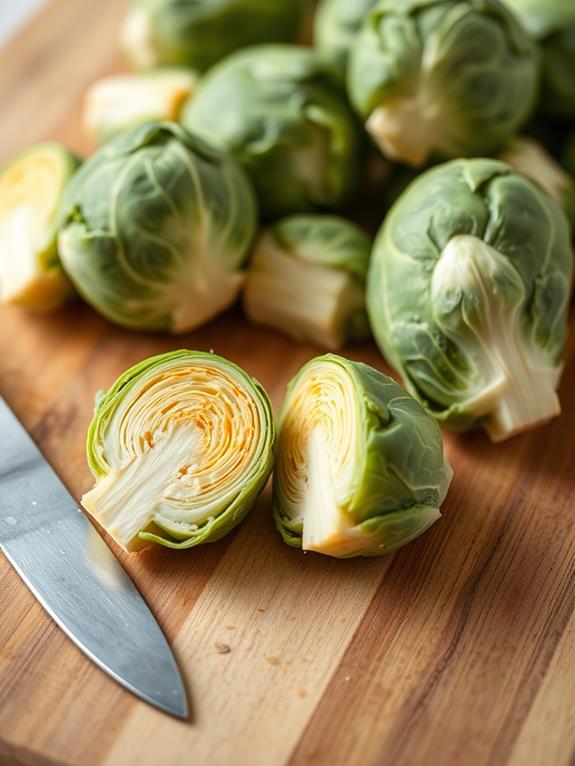
While raw Brussels sprouts offer a unique flavor and texture, they can pose digestive challenges for some individuals. When eaten raw, these cruciferous vegetables contain high levels of indigestible fiber and rafinose, an oligosaccharide that's difficult for your gut to break down. This combination can lead to increased gas production and gastrointestinal discomfort, especially if you're not accustomed to consuming raw cruciferous vegetables. Additionally, incorporating nutrient-rich ingredients like high fiber foods can support digestive health when preparing meals with Brussels sprouts.
If you have a sensitive digestive system or conditions like irritable bowel syndrome (IBS), you may be more susceptible to these issues. Consuming glucosinolates, compounds found in raw Brussels sprouts, can exacerbate bloating and flatulence in some people. To minimize these effects, consider cooking your Brussels sprouts, which helps break down tough fibers and makes them easier to digest.
If you're set on enjoying raw Brussels sprouts, try shredding or marinating them to improve their texture and digestibility. However, be mindful of overconsumption, as their bitter flavor and fibrous nature can lead to further digestive issues. By being aware of these digestive considerations and your own sensitivities, you can make informed decisions about incorporating raw Brussels sprouts into your diet.
Storage and Food Safety Tips
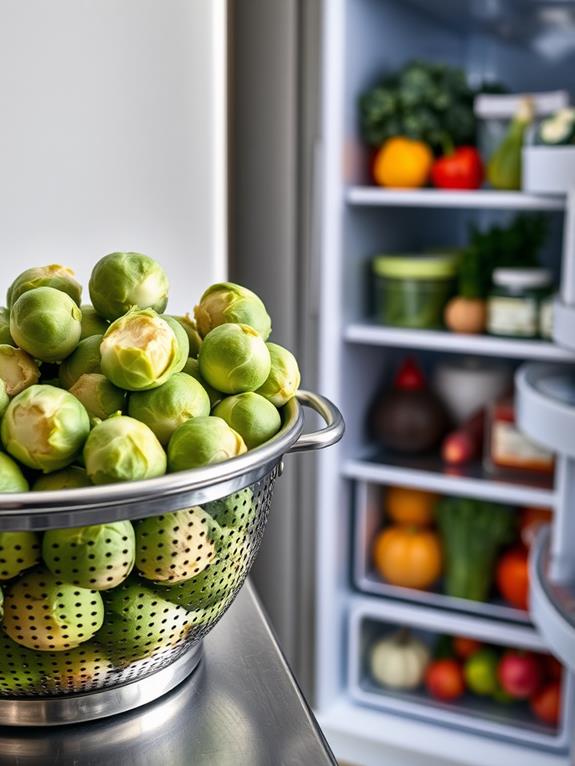
Proper storage and food safety practices are essential when handling raw Brussels sprouts. To guarantee your sprouts remain fresh and safe to eat, follow these guidelines: As with great artists like Donatello, whose attention to detail is reflected in his works, you should also pay attention to the handling of your produce to maintain quality. Donatello's pioneering techniques influenced artistic expression, much like careful storage can enhance the flavor of your Brussels sprouts.
- Store them in a breathable bag or container in your refrigerator.
- Consume within a week for ideal freshness and flavor.
- Wash thoroughly under running water before use.
- Inspect for signs of spoilage, discarding any that look questionable.
When it comes to food safety, you'll want to be vigilant about preventing cross-contamination. Keep your Brussels sprouts separate from raw meats in your refrigerator and during preparation. This simple step can greatly reduce the risk of foodborne illness.
Before consuming raw Brussels sprouts, consider blanching them briefly. This process not only enhances safety but also improves texture and flavor. To blanch, simply immerse the sprouts in boiling water for a minute or two, then immediately transfer them to an ice bath to stop the cooking process.
Frequently Asked Questions
Are Brussel Sprouts Ok to Eat Raw?
Yes, you can eat Brussels sprouts raw. They're safe for most people and offer a crunchy texture with nutritional benefits. Raw sprouts are packed with vitamins C and K, fiber, and antioxidants. However, they may cause digestive discomfort for some due to their high fiber content. If you have hypothyroidism, be cautious as raw Brussels sprouts contain goitrogens. To enhance flavor, try thinly slicing them and adding a tasty dressing. As with any food, moderation is key.
When Should You Not Eat Brussels Sprouts?
Like a ticking time bomb, Brussels sprouts can be problematic for certain individuals. You shouldn't eat them if you have hypothyroidism, as they contain goitrogens that interfere with iodine absorption. If you're dealing with IBS or sensitive digestion, their high fiber content might cause discomfort. Those sensitive to indigestible carbohydrates should avoid them due to raffinose. Always wash them thoroughly to prevent pathogen exposure. If you're not used to raw cruciferous vegetables, eat them in moderation to avoid digestive issues.
What Are the Health Benefits of Raw Brussel Sprouts?
Raw Brussels sprouts offer numerous health benefits. You'll get a boost of vitamins C and K, supporting your immune system and bone health. They're packed with fiber, aiding digestion and promoting gut health. The glucosinolates in raw sprouts may have anticancer properties, while their antioxidants help reduce oxidative stress. You'll also benefit from their low-calorie content, making them great for weight management. By eating them raw, you'll preserve more of these nutrients, maximizing their potential health benefits.
Are Sprouts Safe to Eat Raw?
Yes, sprouts are generally safe to eat raw, but there are some precautions you should take. Always wash them thoroughly to remove potential pathogens. If you have a sensitive digestive system, you might experience gas or discomfort due to their high fiber content. For those with thyroid issues, be aware that raw sprouts contain compounds that can affect iodine absorption. While raw sprouts offer maximum nutrients, cooking them can make them easier to digest for some people.
